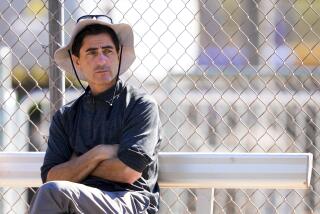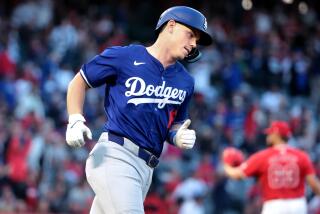Padres Say Deal With the Orioles Set for Wiggins
- Share via
SAN DIEGO — San Diego Padre President Ballard Smith said Tuesday that the Padres and the Baltimore Orioles have agreed on a deal involving second baseman Alan Wiggins. The trade will become final soon, pending the approval of certain new language in Wiggins’ contract, Smith said.
Sources said that the Orioles had agreed to give up either one or two minor leaguers for Wiggins and also pick up his entire four-year, $2.8-million contract. The holdup to the deal, the sources said, was that Baltimore front-office personnel had yet to discuss the trade with the team’s lawyers. However, the Orioles’ lawyers already have come to an agreement with Wiggins’ lawyers, according to the sources.
Earlier, it had been unclear as to what would happen if Wiggins, who recently spent time in a Minnesota drug treatment center, suffered a drug-related relapse. At one time, the Orioles wanted to have the right to release Wiggins in the event of a relapse and then be responsible for just one-third of his remaining guaranteed contract; the Padres would pick up one third of the contract, and Wiggins would forfeit the final third.
Now, it appears that Wiggins will give up one-third of his contract in the event of a relapse. But if the relapse happens in his first year with Baltimore, the Padres will be responsible for 50% of his remaining contract. In the second year, San Diego would be responsible for 25%. In the third year, it would be 10%. In the fourth year, the Padres would have no obligations.
Also, an earlier complication had been that the Orioles wanted to be able to keep Wiggins in the event of a relapse but still reduce his salary. Wiggins’ representatives balked at that, and sources say the Orioles took back the proposal.
Wiggins’ lawyers declined comment Tuesday, and Baltimore officials were unavailable for comment.
Smith, however, said: “We’ve agreed with the Orioles. . . . As soon as it’s done, it’ll be announced right away. Anyway, we have a meeting of minds with the Orioles.”
Meanwhile, with the news of the trade circulating around the league offices, Eugene Orza, associate general counsel of the Major League Players’ Assn., said: “What Alan did two months ago was a mistake. The penalty for his mistake is the one all the clubs and all the players agreed would be the penalty when they ratified the (joint drug) agreement. The penalty is not what the Padres, as grist for their public relations mill, later tried to make it.
“They put Alan through precisely the type of public ordeal that the joint drug agreement sought to preclude. It was convenient for them to say they were doing it for principle, but the implication, of course, is that they’re a more principled club than all the rest. But why they really did it may be exemplified by how the ordeal could have been avoided.
“Two months ago, when all this began, Ballard Smith suggested to us that he’d take Alan back, but only if he (Wiggins) paid for the privilege by giving the Padres more money than the joint drug agreement says a player has to. (In other words, the Padres apparently asked if Wiggins would forfeit his pay during his stay in a drug treatment center.) That is what Ballard means when he talks to the press about non-cooperation (from the players’ association.)
“But there is a silver lining. The Player Relations Committee, and particularly Lee MacPhail, were very cooperative, and, in that, demonstrated not only a commitment to the (drug) agreement but a commitment to administering it fairly. The same can be said of the National League and (league president) Chub Feeney.
“The Orioles not only were cooperative but showed the kind of sensitivity to the human element that is probably the reason they are regarded as such a class organization. They deserve the support of their fans for this.”
More to Read
Go beyond the scoreboard
Get the latest on L.A.'s teams in the daily Sports Report newsletter.
You may occasionally receive promotional content from the Los Angeles Times.










